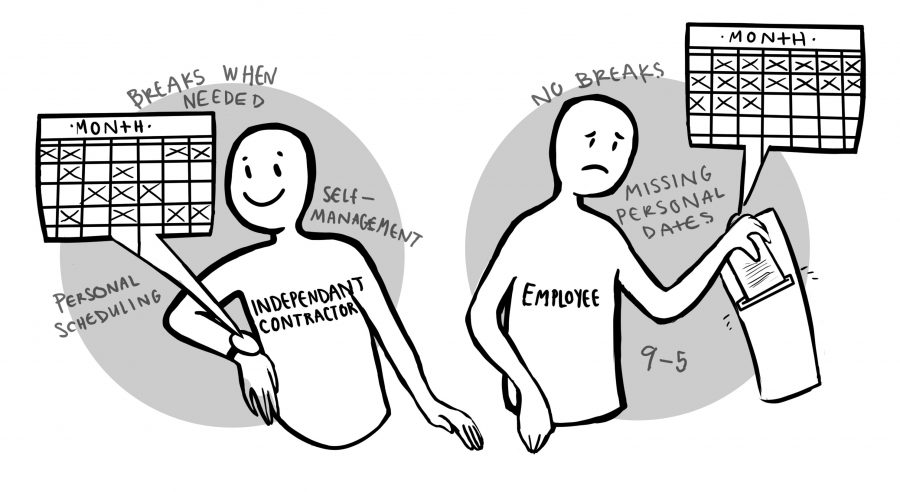“Gig” Economy Drives New Working Relationships
From Uber drivers to Doordash waiters, many people have moved away from the traditional eight-hour work day to have more personalized schedules with flexible hours and salaries. More than 9 million Americans have shifted to alternate work arrangements from 2005 to 2015, pushing this now-called “gig” economy to become what it is today.
While the rise of companies like Uber and Doordash has been very convenient for their consumers by eliminating the need for expensive taxis and having multiple restaurants at users’ disposal, some workers do not feel the same convenience because of their job classification.
Last April, Uber settled a $100 million lawsuit against drivers who believed they should be categorized as “employees” rather than “independent contractors” as independent contractors are not entitled to benefits stipulated under U.S. labor laws such as Social Security and Medicare.
Despite some workers’ arguments, those who work for companies like Uber should continue to be classified as independent contractors as the value of autonomy and flexibility is appealing to a majority of workers.
In a press release, Uber CEO Travis Kalanick claimed 90 percent of drivers chose to work for Uber because they valued the freedom of being independent contractors. According to Kalanick, the company’s growth is partly attributed to the allure of “being your own boss,” Uber now has more than 400,000 drivers in the U.S. alone.
In a survey conducted by Fortune 500, 84 percent of independent contractors preferred to work for themselves. This type of alternative employment, which allows workers to decide their hours and essentially determine their salary, is favorable to workers because it enlarges the area of choice of work experience.
While the lack of benefits and volatility of income can worry workers, more than 80 percent still favor their status as independent workers as seen through Harvard professor Lawrence Katz’s research. The “flexibility of working for themselves” ultimately outweighs other considerations.
“[Workers] value their independence — the freedom to push a button rather than punch a clock,” Kalanick said.
In response to the Uber lawsuit, Kalanick also cited Uber drivers who argued against the change of independent contractors to employees as they “value their freedom as independent contractors too much.”
Yes, some workers do see drawbacks to the situation as independent contractors may tend to have lower hourly salaries compared to employees who do the same work. For many companies who use the system of independent contractors, it can feel like workers are exploited. But at the same time, the workplace is constantly changing and the paradigm shift from an employer-employee relationship to a more open-ended relationship is inevitable. We have to be able to adapt to these circumstances.
Ultimately, people are drawn to the self-determining aspect of being an independent contractor, and the opportunity for choice is what makes companies like Uber so appealing as workers are able to choose the perfect fit for their employment needs. The traditional working world is changing, and keeping up with those changes means adjusting to fit newly-defined working relationships.




